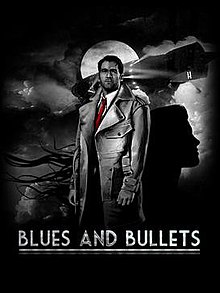

In the dark underbelly of Santa Esperanza, where the sun barely shines and the ghosts of mobsters loiter like it's still the Roaring Twenties, lies "Blues and Bullets." This episodic adventure offers a unique blend of crime noir, alternative history, and enough existential dread to fuel a hipster's poetry readings. Players step into the shiny shoes of Eliot Ness, the legendary prohibition agent turned diner owner, who finds himself knee-deep in trouble when his old nemesis Al Capone makes an unexpected phone call. Spoiler alert: it's not for a slice of pie.
Gameplay involves prowling around an artfully designed, monochrome city searching for clues. But don't be fooled; these aren't your grandmother's puzzles. Expect to match clues like a sadistic game of bingo, except the prize is slightly less glamorous than a cozy cardigan. You'll interrogate witnesses and collect visceral evidence-think less 'cozy crime-solving' and more 'let me show you a horrific crime scene'-and all while casually dodging bullets. Interspersed with the 'detective work' are shooting segments that will make you feel like you just devoured a dozen doughnuts in one sitting: thrilling but slightly regretful. The narrative unfolds like a smoky baritone sax solo, with occasional splashes of color reminding you there's life beyond the sepia tones of despair.
Visually, the game is a feast for the eyes that suffer from the tremors of color-bingeing. The graphics feature a striking monochromatic style with splashes of color that would make any graffiti artist jealous. The character designs reflect the period appropriately, with suits so sharp they could cut glass. They also have an uncanny resemblance to the types you'd see in an old-timey gangster flick-if they had aged about 80 years and were now grabbing coffee at the local diner while contemplating life choices. Backgrounds are rich and atmospheric, reeking of history and bad decisions. The overall aesthetic serves to create an immersive experience, enticing players to linger just a little bit longer, often to the chagrin of their work or social life.
In conclusion, "Blues and Bullets" is a promising start to an episodic tale that's as much about nostalgia as it is about the grueling loops of modern life-where problems don't just last until the next episode. The mix of noir storytelling, crime-solving, and intermittent violence feels like a weird cocktail you'd only order when pretending to be sophisticated. Unfortunately, the promise of more episodes that never materialized feels like a bad breakup; it leaves you hanging, wondering what might have been. If you're cool with that and enjoy a good mystery laced with grim fatalism, give it a whirl. Just remember-never trust a man who runs a diner while having a criminal past. Or a woman. Or anyone, really. Now, if you'll excuse me, I need to convince my therapist that Eliot Ness is real.






